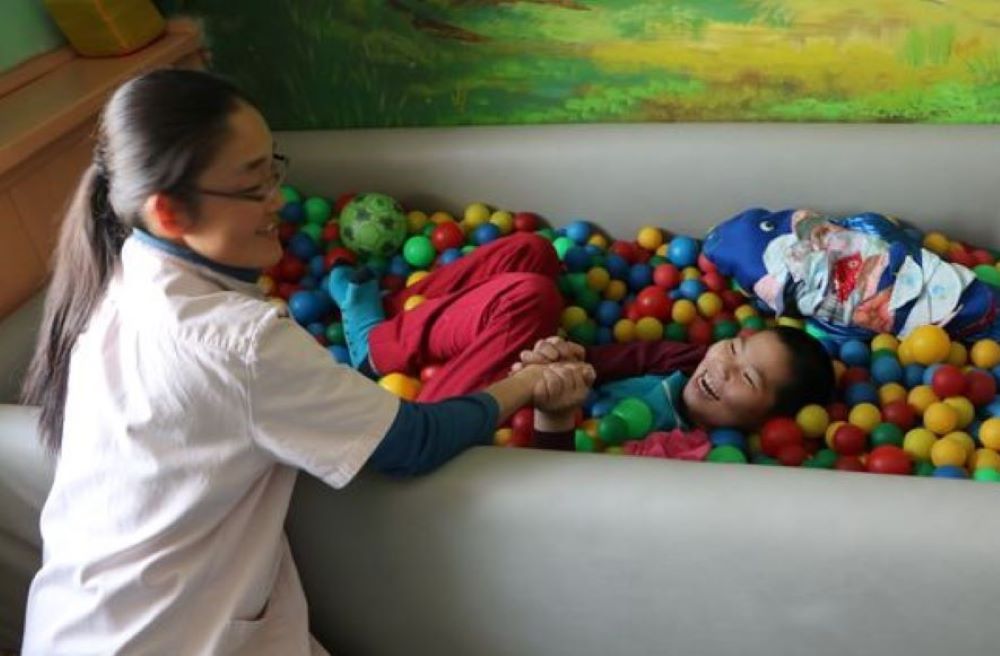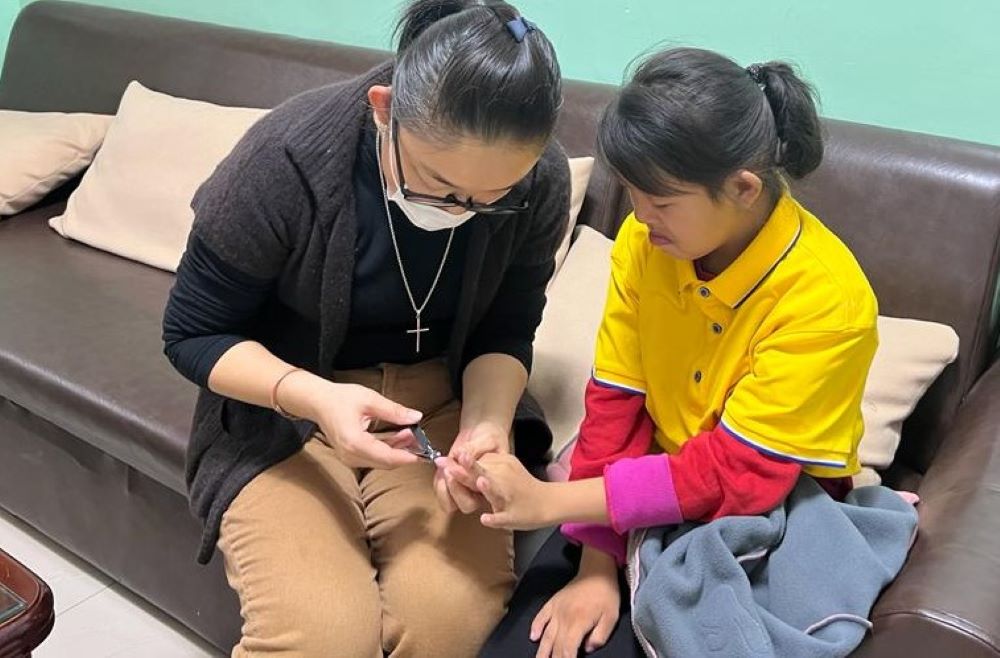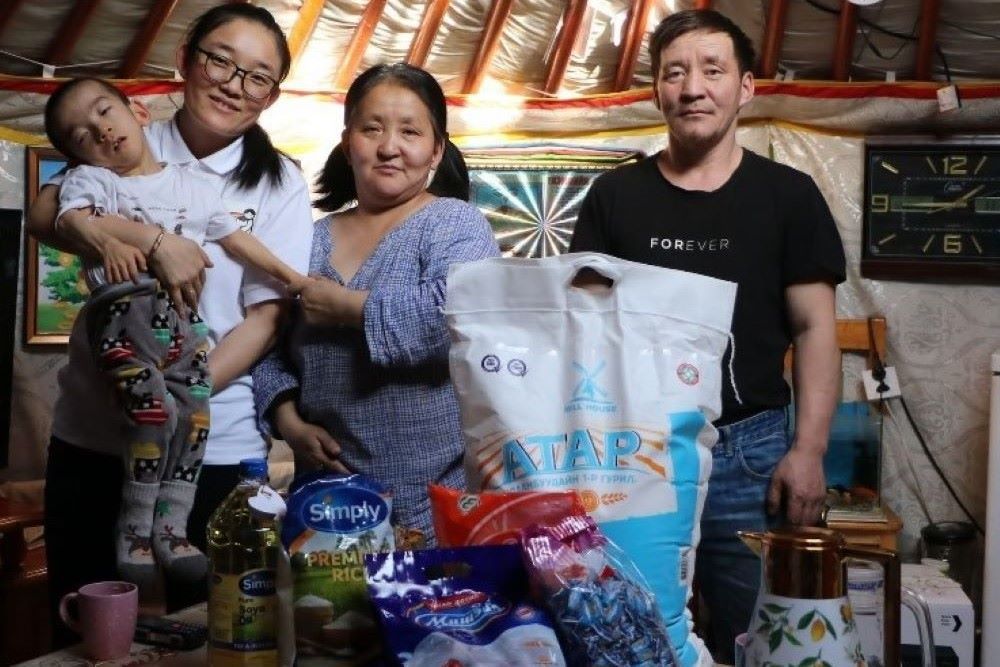
Sr. Magdalena, a Missionary Sister of the Immaculate Heart of Mary ministering in Outer Mongolia, works with a child with disabilities at the Rainbow Center in Ulaanbaatar. (Courtesy of Lucilla Munchi).
I am Sr. Magdalena from Inner Mongolia, an autonomous region in China. I joined the Missionary Sisters of the Immaculate Heart of Mary in 2007. In 2012, I made my first profession in Taiwan, and then in 2020, I made my final profession in my mission land in Mongolia.
In 2014, I was sent on a mission to Outer Mongolia, which is a separate country. I am a Chinese of Mongolian descent. The first time I traveled to Mongolia, I felt like I was returning home to my roots as a Mongolian in China. On my way to Mongolia, I listened to one of my favorite songs, "Ulaanbaatariin udesh," meaning The Night of Ulaanbaatar. The lyrics reflect how much I cherish the peaceful and beautiful country I am heading to.
I love Mongolia from the depths of my heart. I felt like I returned to my childhood, with the roads, the buses, the small street vendors and the different modes of transportation. People are warm, welcoming and simple, often saying, "We are the same Mongolians." Women in Mongolia are revered as people who uphold the whole family, showing great love for their kin and being willing to sacrifice everything for them. Yet, they also enjoy parties and karaoke to relax or relieve stress. For women in Mongolia, life is to be enjoyed, and they rarely plan for the future.
However, I have encountered many challenges as a Mongolian from Inner Mongolia. There have been moments when I have struggled with my identity, torn between being Chinese or Mongolian. My heritage is half Chinese and half Mongolian, and I studied in a Chinese school even though we live more within the Mongolian cultural influences. Some Mongolians see me as one of their own, whereas others label me with the word "Huujia," which has a negative connotation toward Chinese individuals.

Sr. Magdalena, director of the Rainbow Center in Ulaanbaatar, Outer Mongolia, trims the nails of a student with Down Syndrome. (Courtesy of Lucilla Munchi)
After studying the Mongolian language for a year, my superior assigned me to teach at the Rainbow Center, a task I willingly accepted. Since 2015, I have been working with children and youth with disabilities. There is both passion and challenge in working with them. Initially, I did not know much about them, especially those with severe challenges. Working with them was an enormous challenge for me at the beginning.
At first, being attentive to their needs proved very challenging, and constantly repeating basic instructions such as eating, sitting, using the toilet, pulling up pants and taking off shoes became very tiring.
While caring for and loving them for a short time was more manageable, a long-term commitment sometimes made me feel like I was one of them. I felt like I had no personal life and was wasting my time and youth doing such a job. I doubted and questioned many times: Is this really what I am called to do? Am I called to teach the local people to do what I am doing?
As a missionary, am I not called to evangelize and share the Good News with people? Yet, here, I am working with individuals who do not know about religion, and we are not even allowed to engage in evangelization or even discuss religion. So, I tried my best to be involved in church activities on weekends and maintain contact with people outside my ministry, such as working with children and youth with disabilities and balancing my life to be able to be involved in church activities and do some community service. There were many frustrations and doubts, and I frequently questioned myself. Am I on the right path? Is the work I do at this center meaningful? The only driving force behind my commitment to work was the love of God I experienced in my religious journey and my desire to share this love with all humanity.

Sr. Magdalena, left, a Missionary Sister of the Immaculate Heart of Mary ministering in Outer Mongolia, makes home visits to children with multiple disabilities. (Courtesy of Lucilla Munchi)
Gradually, I discovered that the most extraordinary thirst for these children and youth is love and care, as Pope Francis emphasized during his visit to Mongolia. Society often neglects them and sees them as a burden to their families. Those with multiple disabilities are unable to talk and struggle to express their needs and feelings. Sadly, they are frequently misunderstood and labeled as "crazy."
As time passes, my love for these children and youth grows. They are innocent and loveable, like angels in this world, showing the essence of our humanity. With them, I've learned that my vocation is love. Gradually, I understood why God brought me to work with these children and youth; it was to test my capacity to love through my service with them. Though working with children and youth with disabilities remains tiring, it feels less tedious than before.
The passion to work with them reflects the dual passion of our mother foundress: Passion for God and his people. As the center director, I always think about what I can do to help support these children and their families. How can we help them grow and secure a better future?
The first step in working with people with mental disabilities is acceptance and love. As Pope Francis stated, "Only love slakes our hearts' thirst, only love heals our wounds, only love brings us true joy."
Advertisement
The second goal is to promote their independence and lessen the burden on their families. Additionally, we integrate them into mainstream education as fully as possible. Lastly, we aim to secure suitable employment opportunities in companies or restaurants for our adult group, enabling them to work and lead dignified lives like their peers.
I am grateful to my formators who provided me with opportunities to work with individuals with disabilities. Before my assignment to Outer Mongolia, I had the privilege of working with people with disabilities. These experiences laid a solid foundation for me to engage with our children and youth with disabilities in Mongolia.
These experiences have taken on a profound meaning as I walk among my Mongolian brothers and sisters. I am grateful to God because my missionary life as an Inner Mongolian Missionary Sisters of the Immaculate Heart of Mary has been a long journey with God.







